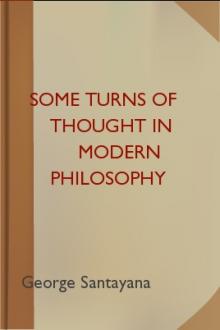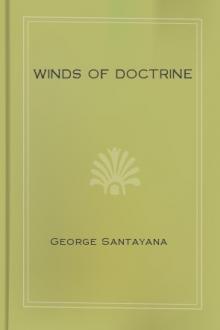Some Turns of Thought in Modern Philosophy, George Santayana [if you liked this book .TXT] 📗

- Author: George Santayana
- Performer: -
Book online «Some Turns of Thought in Modern Philosophy, George Santayana [if you liked this book .TXT] 📗». Author George Santayana
All ambitions must be defeated when they ask for the impossible. The ambition to know is not an exception; and certainly our perceptions cannot tell us how the world would look if nobody saw it, or how valuable it would be if nobody cared for it. But our perceptions, as Locke again said, are sufficient for our welfare and appropriate to our condition. They are not only a wonderful entertainment in themselves, but apart from their sensuous and grammatical quality, by their distribution and method of variation, they may inform us most exactly about the order and mechanism of nature. We see in the science of today how completely the most accurate knowledge—proved to be accurate by its application in the arts—may shed every pictorial element, and the whole language of experience, to become a pure method of calculation and control. And by a pleasant compensation, our aesthetic life may become freer, more self-sufficing, more humbly happy in itself: and without trespassing in any way beyond the modesty of nature, we may consent to be like little children, chirping our human note; since the life of reason in us may well become science in its validity, whilst remaining poetry in its texture.
I think, then, that by a slight re-arrangement of Locke's pronouncements in natural philosophy, they could be made inwardly consistent, and still faithful to the first presuppositions of common sense, although certainly far more chastened and sceptical than impulsive opinion is likely to be in the first instance.
There were other presuppositions in the philosophy of Locke besides his fundamental naturalism; and in his private mind probably the most important was his Christian faith, which was not only confident and sincere, but prompted him at times to high speculation. He had friends among the Cambridge Platonists, and he found in Newton a brilliant example of scientific rigour capped with mystical insights. Yet if we consider Locke's philosophical position in the abstract, his Christianity almost disappears. In form his theology and ethics were strictly rationalistic; yet one who was a Deist in philosophy might remain a Christian in religion. There was no great harm in a special revelation, provided it were simple and short, and left the broad field of truth open in almost every direction to free and personal investigation. A free man and a good man would certainly never admit, as coming from God, any doctrine contrary to his private reason or political interest; and the moral precepts actually vouchsafed to us in the Gospels were most acceptable, seeing that they added a sublime eloquence to maxims which sound reason would have arrived at in any case.
Evidently common sense had nothing to fear from religious faith of this character; but the matter could not end there. Common sense is not more convinced of anything than of the difference between good and evil, advantage and disaster; and it cannot dispense with a moral interpretation of the universe. Socrates, who spoke initially for common sense, even thought the moral interpretation of existence the whole of philosophy. He would not have seen anything comic in the satire of Molière making his chorus of young doctors chant in unison that opium causes sleep because it has a dormitive virtue. The virtues or moral uses of things, according to Socrates, were the reason why the things had been created and were what they were; the admirable virtues of opium defined its perfection, and the perfection of a thing was the full manifestation of its deepest nature. Doubtless this moral interpretation of the universe had been overdone, and it had been a capital error in Socrates to make that interpretation exclusive and to substitute it for natural philosophy. Locke, who was himself a medical man, knew what a black cloak for ignorance and villainy Scholastic verbiage might be in that profession. He also knew, being an enthusiast for experimental science, that in order to control the movement of matter—which is to realise those virtues and perfections—it is better to trace the movement of matter materialistically; for it is in the act of manifesting its own powers, and not, as Socrates and the Scholastics fancied, by obeying a foreign magic, that matter sometimes assumes or restores the forms so precious in the healer's or the moralist's eyes. At the same time, the manner in which the moral world rests upon the natural, though divined, perhaps, by a few philosophers, has not been generally understood; and Locke, whose broad humanity could not exclude the moral interpretation of nature, was driven in the end to the view of Socrates. He seriously invoked the Scholastic maxim that nothing can produce that which it does not contain. For this reason the unconscious, after all, could never have given rise to consciousness. Observation and experiment could not be allowed to decide this point: the moral interpretation of things, because more deeply rooted in human experience, must envelop the physical interpretation, and must have the last word.
It was characteristic of Locke's simplicity and intensity that he retained these insulated sympathies in various quarters. A further instance of his many-sidedness was his fidelity to pure intuition, his respect for the infallible revelation of ideal being, such as we have of sensible qualities or of mathematical relations. In dreams and in hallucinations appearances may deceive us, and the objects we think we see may not exist at all. Yet in suffering an illusion we must entertain an idea; and the manifest character of these ideas is that of which alone, Locke thinks, we can have certain "knowledge".
"These", he writes, "are two very different things and carefully to be distinguished: it being one thing to perceive and know the idea of white or black, and quite another to examine what kind of particles they must be, and how arranged ... to make any object appear white or black." "A man infallibly knows, as soon as ever he has them in his mind, that the ideas he calls white and round are the very ideas they are, and that they are not other ideas which he calls red or square.... This ... the mind ... always perceives at first sight; and if ever there happen any doubt about it, it will always be found to be about the names and not the ideas themselves."
This sounds like high Platonic doctrine for a philosopher of the Left; but Locke's utilitarian temper very soon reasserted itself in this subject. Mathematical ideas were not only lucid but true: and he demanded this truth, which he called "reality", of all ideas worthy of consideration: mere ideas would be worthless. Very likely he forgot, in his philosophic puritanism, that fiction and music might have an intrinsic charm. Where the frontier of human wisdom should be drawn in this direction was clearly indicated, in Locke's day, by Spinoza, who says:
"If, in keeping non-existent things present to the imagination, the mind were at the same time aware that those things did not exist, surely it would regard this gift of imagination as a virtue in its own constitution, not as a vice: especially if such an imaginative faculty depended on nothing except the mind's own nature: that is to say, if this mental faculty of imagination were free".
But Locke had not so firm a hold on truth that he could afford to play with fancy; and as he pushed forward the claims of human jurisdiction rather too far in physics, by assuming the current science to be literally true, so, in the realm of imagination, he retrenched somewhat illiberally our legitimate possessions. Strange that as modern philosophy transfers the visible wealth of nature more and more to the mind, the mind should seem to lose courage and to become ashamed of its own fertility. The hard-pressed natural man will not indulge his imagination unless it poses for truth; and being half aware of this imposition, he is more troubled at the thought of being deceived than at the fact of being mechanised or being bored: and he would wish to escape imagination altogether. A good God, he murmurs, could not have made us poets against our will.
Against his will, however, Locke was drawn to enlarge the subjective sphere. The actual existence of mind was evident: you had only to notice the fact that you were thinking. Conscious mind, being thus known to exist directly and independently of the body, was a primary constituent of reality: it was a fact on its own account.[6] Common sense seemed to testify to this, not only when confronted with the "I think, therefore I am" of Descartes, but whenever a thought produced an action. Since mind and body interacted,[7] each must be as real as the other and, as it were, on the same plane of being. Locke, like a good Protestant, felt the right of the conscious inner man to assert himself: and when he looked into his own mind, he found nothing to define this mind except the ideas which occupied it. The existence which he was so sure of in himself was therefore the existence of his ideas.
Here, by an insensible shift in the meaning of the word "idea", a momentous revolution had taken place in psychology. Ideas had originally meant objective terms distinguished in thought-images, qualities, concepts, propositions. But now ideas began to mean living thoughts, moments or states of consciousness. They became atoms of mind, constituents of experience, very much as material atoms were conceived to be constituents of natural objects. Sensations became the only objects of sensation, and ideas the only objects of ideas; so that the material world was rendered superfluous, and the only scientific problem was now to construct a universe in terms of analytic psychology. Locke himself did not go so far, and continued to assign physical causes and physical objects to some, at least, of his mental units; and indeed sensations and ideas could not very well have other than physical causes, the existence of which this new psychology was soon to deny: so that about the origin of its data it was afterwards compelled to preserve a discreet silence. But as to their combinations and reappearances, it was able to invoke the principle of association: a thread on which many shrewd observations may be strung, but which also, when pressed, appears to be nothing but a verbal mask for





Comments (0)